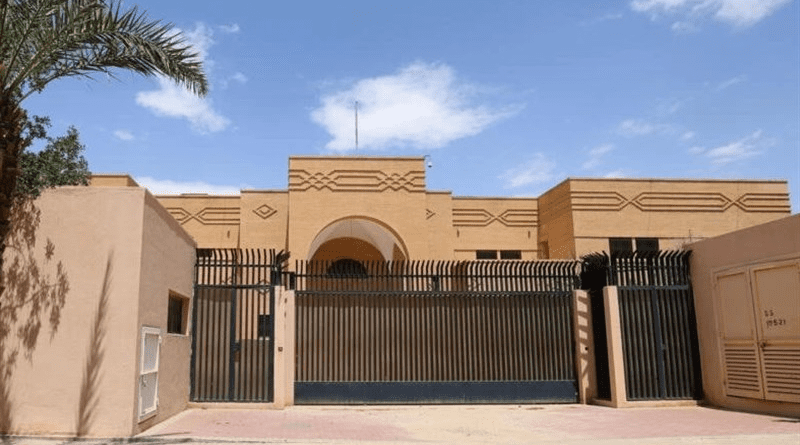A New Era In Middle Eastern Diplomacy: Iran Reopens Embassy In Saudi Arabia – OpEd
By Dr. Sahibzada Muhammad Usman
In a significant shift from longstanding regional rivalries, Iran has reopened its embassy in Saudi Arabia on June 6, 2023, seven years after diplomatic ties were severed between the two nations. The historical event signals a thawing of relations and fosters hope for a more stable future in the Middle East.
The diplomatic mission reopened following a deal to re-establish ties, a move that could potentially defuse a rivalry that has fueled conflicts across West Asia. The two regional giants, Iran as the leading Shia Muslim power and Saudi Arabia, the predominant Sunni Muslim nation, had been in a struggle for regional dominance for decades. Their rivalry was exacerbated by proxy wars across the Middle East, particularly in Yemen, Lebanon, and Iraq, often resulting in accusations of meddling in each other’s internal affairs.
However, the reopening of the embassy heralds a new era of cooperation and convergence between the two nations, with an expected positive impact on the stability, prosperity, and progress of the region. Iran’s Deputy Foreign Minister, Alireza Bigdeli, affirmed this sentiment during the embassy reopening ceremony.
The restoration of diplomatic ties came as a result of a deal brokered by China, who has shown increasing interest in securing a foothold in the geopolitics of the Middle East. China’s involvement in the restoration of ties between Iran and Saudi Arabia underscores the shifting power dynamics in the region, reflecting China’s ambition to establish its diplomatic and political credentials in the Middle East where it has high economic stakes.
This diplomatic rapprochement will undoubtedly change the geopolitical landscape of the Middle East. For one, it marks a significant de-escalation in a rivalry that has contributed to instability across the region for years. Both countries have agreed to respect each other’s sovereignty and refrain from interfering in each other’s internal affairs, which could lead to a more peaceful and stable region.
With the resumption of diplomatic relations, several crucial steps are expected to be taken in the near future. These include the reopening of the Saudi embassy in Tehran, increased trade, resumption of direct flights, and renewed cultural accords between the two nations. The eased diplomatic ties may also facilitate pilgrimage to Mecca for Iranian citizens, previously hampered by strained relations.
However, it’s important to understand that this diplomatic shift does not necessarily signify an immediate end to the complex regional tensions that have existed for decades. The implications of these diplomatic moves are far-reaching and extend beyond the bilateral relations of Iran and Saudi Arabia. It also indicates a broader realignment in the region, including Saudi Arabia’s decision to restore ties with Syria, and its steps toward ending its long-running war in Yemen against Iranian-backed Houthis.
The normalization of relations between Iran and Saudi Arabia may also inspire other Middle Eastern nations to review their diplomatic ties. Evidence of this trend is already emerging with Egypt and Iran exploring opportunities to enhance their diplomatic relationship, a move being mediated by Oman.
Despite this progress, however, Iran’s nuclear ambitions remain a global concern. On the same day Iran reopened its embassy, U.S. Secretary of State Antony Blinken arrived in Saudi Arabia where he was expected to discuss matters including Iran, oil prices, Chinese and Russian influence, and the possibility of Saudi Arabia normalizing ties with Israel.
Historically, Pakistan has maintained a delicate balance in its relationships with Iran and Saudi Arabia. Its geographical location as Iran’s neighbor and its longstanding partnership with Saudi Arabia have placed Pakistan in a unique position to mediate between the two nations.
Pakistan has long pursued a strategy of neutrality in the Iran-Saudi rivalry, albeit with a tilt towards Saudi Arabia due to economic dependence and religious affiliation. In the past, Pakistani leaders, including former Prime Minister Nawaz Sharif made significant efforts to facilitate dialogue between Iran and Saudi Arabia. The restoration of diplomatic ties between Iran and Saudi Arabia presents massive implications and opportunities for Pakistan. With improved relations between its two influential neighbors, Pakistan can now maintain balanced diplomatic ties with both states, a long-cherished goal for the nation.
A less contentious relationship between Iran and Saudi Arabia is a positive development for Pakistan’s domestic security. Historically, Pakistan’s ties with both countries have been strained by cross-border crime and terrorism. The normalization of Iran-Saudi Arabia relations presents a platform for multilateral cooperation in addressing these issues.
Further, Pakistan stands to benefit economically from improved Iran-Saudi Arabia relations. With less regional tension, trade and transit routes are likely to open up, possibly fostering economic growth in Pakistan. Moreover, being a key ally of China, Pakistan may also gain from the triangular cooperation between China, Iran, and Saudi Arabia, which could see Beijing investing more heavily in the region, including Pakistan, as part of its Belt and Road Initiative.
Finally, the reopening of Iran’s embassy in Saudi Arabia signifies a pivotal shift in Middle Eastern politics, moving towards a new era of diplomatic engagement and conflict resolution. While it’s crucial to remain aware of ongoing concerns, particularly Iran’s nuclear aspirations, the normalization of relations between these two regional powers may serve as a cornerstone for regional stability, peace, and prosperity in the Middle East. Pakistan’s past efforts to mediate between the two countries reflect its desire for regional stability, which now seems to be within grasp. As Iran and Saudi Arabia move toward a more collaborative future, Pakistan also stands to reap considerable benefits in terms of diplomacy, security, and economic growth.
Dr. Sahibzada Muhammad Usman, Research Scholar and Academic; Ph.D. in Political Science at the University of Pisa, Italy. Dr. Usman has participated in various national and international conferences and published 30 research articles in international journals.

